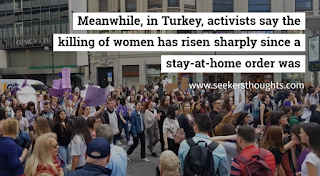Significantly, China, France, the U.K
and other countries including India has seen the rise in woman abuse cases. The
violence has increased globally.
The current atmosphere of fear, uncertainty, food insecurity, and unemployment may create feelings of inadequacy in men.Buy Seeker's Thoughts Magazine for April 2020- Corona Special Edition
All these factors are only likely to aggravate
tensions at home and make women victims of those tensions.
Due
to regressive social norms, woman lack of access to friends, family and support
organisations is expected to aggravate the situation for abused women further.
The national family health survey data
shows that 24% of women face domestic violence in 2015 to 2016 not seeing any
reduction since 2005 to 2006.
Play the abuse of women is seen very
normal between both genders In India and in other countries. In India, according
to the data off National Family Health Survey 52% of women and 42% of men think
that there is at least one valid reason for wife beating.
Family health surveys data also
highlighted that women from the families of lower wealth reported more
violence.
Also Read,
Woman tend to be more affected
adversely during epidemic, as there is always a subordination of woman in
society.
In April, Malaysia's Women, Family and Community Development
Ministry stirred a controversy after it asked women to dress nicely at home and
not bother male members of their families during the national lockdown to
reduce the spread of the novel coronavirus. After an outcry on social media,
the authorities apologized and withdrew their "recommendations."
In France, domestic violence has risen by 36%, including two
cases of femicide, since the beginning of the lockdown. To help tackle
this, the government has announced that it will be paying for victims to stay
in hotels, whilst pop-up counselling centres will be installed in shops in the
hope that women out buying groceries will be able to access them easily.
In the United Kingdom the police are encouraging victims to
use what they are calling a silent call: by calling the emergency number 999
and then dialing 55 the police say that they will recognise the call as “a
cause for concern”.
In Australia, Prime Minister Scott Morisson announced a 75%
rise in Google searches for help since the start of the lockdown. And The
government has given a S$142 million boost in funding to tackle domestic
violence.
In South Africa, authorities said there were nearly 90,000
reports of violence against women in the first week of a lockdown.
Meanwhile, in Turkey, activists say the
killing of women has risen sharply since a stay-at-home order was issued on
March 11.
Also Read,
lockdowns and quarantines are essential to suppressing
COVID-19, but they can trap women with abusive partners.
Many researchers believe the best way
to deter abuse is to stop people from becoming abusers in the first place. And
several approaches have shown promise.
Broad, cultural messages appear to make
a difference—not just what young children see and hear, from their families and
neighbours but also from their role models on television and in sports arenas,
may have an impact.
What is the
solution?
When women and man get employed,
domestic violence tend to fall as the interaction between couples reduces.
The atmosphere of fear, uncertainty,
food in security, and unemployment created the feelings of inadequacy in men,
however, everyone feels the same during the time of social stress. This is the
inability of men to handle his emotion which hampers the peace of women.
Men dominated world really needs
psychological counselling at school level that beating wife, woman or daughter
does not prove the masculinity instead it shows that one is ‘unable’ and weak
to handle the time of crisis.
Women also discouraged socially to
complaint against the men in police, therefore, there are women who never
expose the husband in case of domestic violence until the violence is constant
and unbearable. Therefore, encourage women to speak against the violence.
In short term, the government should open
more helpline for women, and arrange the shelter homes for women to have
mobility.
















No comments:
Post a Comment